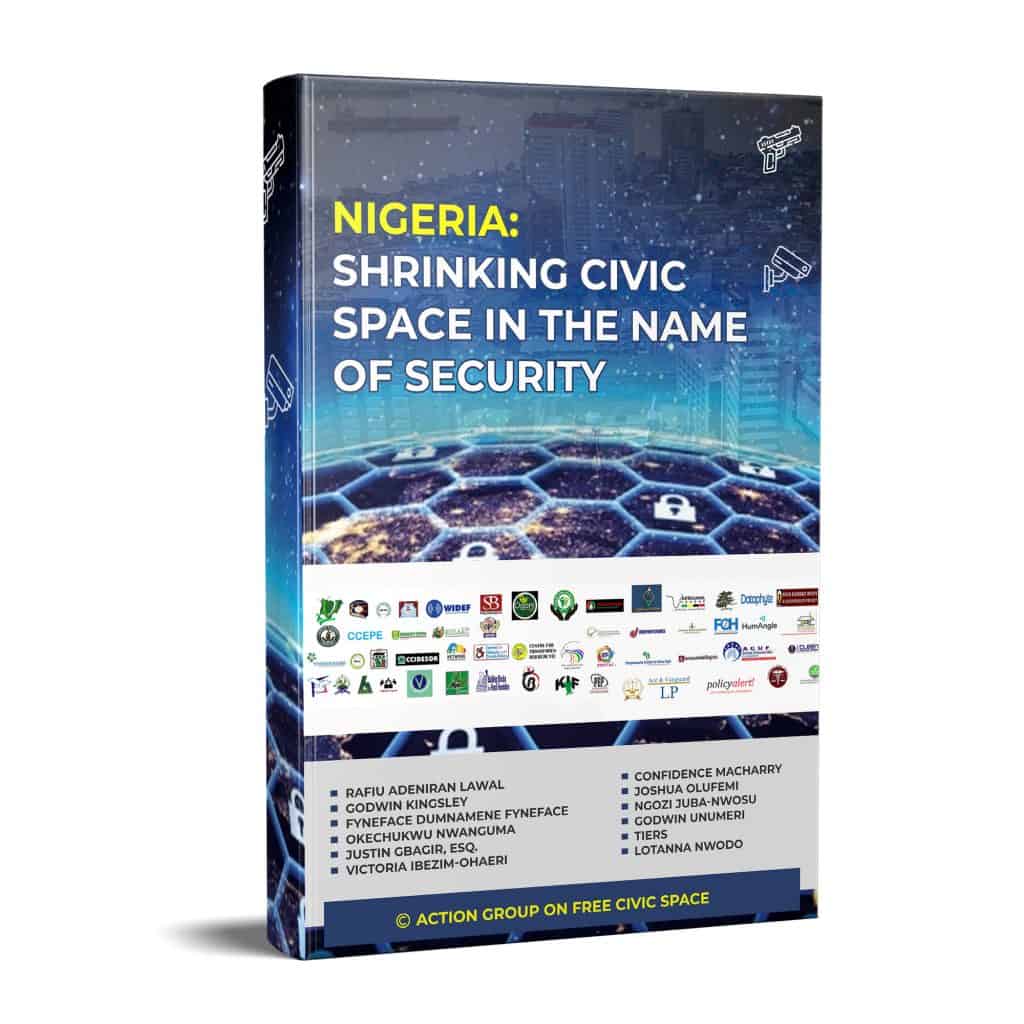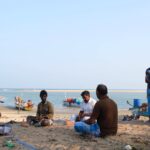This article was published more than 3 years ago.
Civic space in Nigeria is under threat. Government officials and agencies have turned to increasingly authoritarian tactics to silence dissent and maintain control. And they’ve abused seemingly well-intended laws and statutes—meant to counter terrorism, stop money laundering, and tackle the COVID-19 pandemic—to surveil, detain, and prosecute activists and ordinary citizens.
[What is civic space? Check out our Fund 101 explainer.]
The Action Group on Free Civic Space, a coalition of Nigerian civil society groups, calls this set of nefarious tactics, strategies, and technologies the Security Playbook. In two reports released last year, they examined how the government has misused digital technologies and exploited global security measures. Today, they published the third and final report in the series: Shrinking Civic Space in the Name of Security. In it, they document how the Nigerian state has used its security and counterterrorism architecture to stifle civil society, discourage active civic participation, and chill civic space.
We spoke with Victoria Ibezim-Ohaeri, the executive director of Spaces for Change and one of the lead authors on the report, to learn more.
This interview has been edited for clarity and length.
What is the Security Playbook series?
The Security Playbook series is a research project conducted by the Action Group on Free Civic Space, a group of eleven Nigerian civil society organizations, that looks at how extensively the state has used securitization to limit civil society and disenable the environment for active civic participation in Nigeria.
[ICYMI: Read James Savage on the first two Security Playbook reports.]
The research basically looks at the different types of security architecture in the country, and the approaches that are allowing governments to exercise powers—not just without due process, but in ways that rapidly shrink the rights to free speech, association, and assembly.
What does the third and final report, Shrinking Civic Space in the Name of Security, focus on?
All three reports look at different aspects of the security playbook—the actors, the regulations, the tools, the measures that governments have been using to narrow down the spaces for civil society operations using security as an excuse.
This report particularly focuses on the exploitation of the security challenges itself to undermine the ability of citizens to speak, to associate, and to organize freely or to mobilize for citizen action and participate in government process. It also examines how the security paradigm itself is enabling restrictions on civic spaces, both online and offline.
What are the key findings in this report?
This report reveals the security agents who are responsible for these restrictions, and the tactics, the tools, and the measures they are using. It also looks at the civic actors who are most impacted by the restrictions and how they are pushing back.
Its public knowledge that state actors are overreaching their regulatory and law enforcement powers to crush civil liberties. But this report provides the evidence. It is a platform to document the specific incidents that have happened, understand the patterns, and provide in-depth analysis on the kinds of restrictions that we are seeing in Nigeria and the type of responses that are needed.
Finally, it looks beyond Nigeria to what is happening at the international level—how the absence of civil society voices within international bodies and agencies is responsible for the lack of checks and balances in the measures that we’re seeing.
Tell us how the Nigerian government has abused counterterrorism measures to restrict civic space.
First and foremost is the misuse of security laws, security measures, and security institutions—most of which were installed, by the way, in compliance with Nigeria’s international law obligations.
What we have seen on the ground begins with a lack of clarity. “Terrorism” is not defined by these security laws and policies. That uncertainty is being exploited on a political basis.
Many offenses listed in terrorism legislation are already covered by existing criminal statutes. Law enforcement can cherry-pick which law they use to justify criminal charges. This means that people involved in simple offenses, which ordinarily fall within the purview of our criminal legislation, may be accused instead of terrorism to obtain the harshest possible punishment.
The last part is that the security architecture of the country was developed in response to Boko Haram. Now, this security architecture—designed specifically to counter Boko Haram—is being applied to all security challenges across the country. That has increased opportunities for security systems to be misused to crack down on civil liberties and fundamental freedoms.
What impact has this had on the rights and lives of Nigerians?
Ordinary citizens—not even activists, just active citizens—that have been critical of the government have been charged with terrorism or blasphemy. When charged with terrorism, they get the harshest punishment for something as simple as posting a comment on Facebook.
Statutes governing things like sedition, defamation, and treason have been frequently invoked to arrest and detain and prosecute private citizens—of course, including civic actors—for very benign activities like peaceful protests or publishing satire on social media. Public protest, for instance, has been framed as a push for regime change—a felony that attracts some of the heaviest punishments.
So, terrorism architecture has given government absolute power to paint very serious felonies and smaller offences with the same brush. This is the way it’s really affected ordinary citizens.
COVID-19 has exacerbated some of these restrictions and provided additional justification for the government to crack down on civil liberties. Some of the legislation and regulations enacted at both the federal and state levels in the wake of the pandemic stipulated adherence to so many recommended health and safety protocols—even those that were very, very necessary. This has reinforced fears of not just expanded government authority to clamp down on civic freedoms, but it has provided a new excuse to introduce measures that interfere with civil liberties.
What can local civil society in Nigeria do to push back against securitization?
One of the top provisions invoked by state actors to justify limitations on civil society in the name of security is Section 45 of the Nigerian Constitution. That provision says that the state can derogate from respecting some rights and constitutional guarantees in certain circumstances, including in the public interest or the interest of national security.
We acknowledge that Section 45 is not inherently a bad law. But the time has come for civil society to consider initiating public interest lawsuits, inviting the courts to clarify those exception circumstances when derogations from constitutional guarantees can be lawfully invoked by the government or its agencies in the name of national security.
Another opportunity is for civil society to leverage their partnerships with progressive-minded federal lawmakers to push back on bills that are designed to interfere with the operations of civil society. Civil society can monitor policy prescriptions, especially before they become law. That way, they can detect the inclusion of restrictive and disturbing clauses and draft statutes. That early detection can give them enough time to launch campaigns to challenge those initiatives. It was the vigilance of civil society that helped to halt the passage of the NGO bill.
Another recommendation is to form strong coalitions and networks, like the Action Group. Coalitions and networks have leverage and resources to push for social change. That can help ward off reprisal from the government, because the state finds it easier to target individual organizations rather than entire groups.
What can activists and human rights defenders around the world—who might be dealing with similar tactics—learn from this research?
From the international perspective, the first thing to know is that when terrorism resolutions are made without adequate impute from developing countries, they usually do not take account of local contexts and realities. That cause enormous dislocations, especially during implementation.
The second thing is that the poor implementation of international counterterrorism norms at the national level is giving rise to repressive laws and normalizing the enforcement of oppressive regimes at the local level.
Thirdly, a lot of reviews at the international level are not trickling down. Reviews happen at the same time that laws are being made, institutions are being established, and security powers are being expanded. It’s not automatic that the review will trickle down. Sometimes, they defy gravity.
This is an opportunity for them to understand that changes are necessary, and that they must take steps to ensure those changes really do trickle down to the national and local levels.
Finally, I think there is a lot of copy-and-pasting of bad practices across countries. Increasingly, countries are drifting towards authoritarianism, becoming more intolerant of dissent. This evidence from Nigeria is an opportunity for other countries to compare and contrast their notes, to learn from what has happened, and to see how Nigerian civil actors have pushed back over the years.
How can international partners and allies, like the Fund, support this work? What do frontline activists need to succeed?
We anticipate that our findings might be disruptive in the short term. But in the long term, it will be very transformative—providing alternative visions for rethinking security in the national context.
What partners can do is support additional areas of research to ensure that civil society advocacy is supported by facts and evidence. When reports are credible, it helps ward off government reprisals and provides legal defense.
There is also need for advocacy and engagement with counterterrorism institutions at the national level. We hope to communicate some of these ideas to state actors, share ideas about how we can find common grounds, and transform the security landscape.
On the international level, there’s a lot of opportunities for support. For instance, countries that have been aiding Nigeria can introduce respect for human rights and open civic space as conditions for development assistance. That way, allies can help the Nigerian government understand that tolerating dissent and keeping civic space free is good practice.
Finally, there is a need to continue to support the work of coalitions that are complementing each other’s skills and pushing back collectively. As I mentioned, the government usually does not like attacking groups, so being in a coalition has served a protective mechanism.
These are the three ways that groups like the Fund can support this work, amplify the voices of civil society, and leverage connections at the international level.



